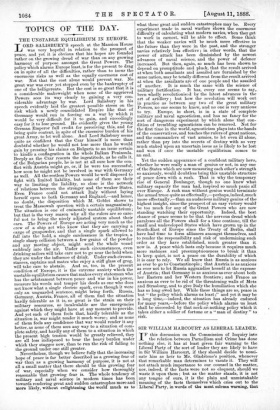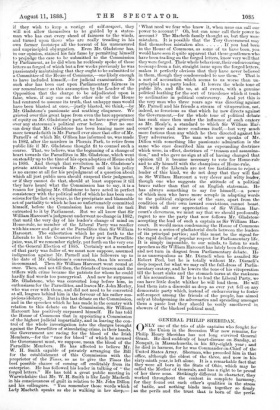SIR WILLIAM HARCOURT AS LIBERAL LEADER.
IF this discussion on the Commission of Inquiry into the relation between Parnellism and Crime has done nothing else, it has at least given fair warning to the Liberal Party of the sort of leader they are likely to have in Sir William Harcourt, if they should decide to nomi- nate him as heir to Mr. Gladstone's position, whenever that remarkable man determines to vacate it. They will not attach much importance to our counsel in the matter, nor, indeed, if the facts were not so eloquent, should we waste it upon them ; but as the matter stands, it is not any tongue of ours, it is the plain and unmistakable meaning of the facts themselves which cries out to the Liberal Party, in words of the most solemn warning, that if they wish to keep a vestige of self-respect, they will not allow themselves to be guided by a states- man who has cast every shred of fairness to the winds, and turned upon those who are really treading in his own former footsteps all the torrent of his unmeasured and unprincipled objurgation. Even Mr. Gladstone has, in our opinion, stained his fair fame by permitting himself to prejudge the case to be submitted to the Commission by Parliament, as he did when he recklessly spoke of those letters as forged of which but a few weeks previously he was passionately maintaining that they ought to be submitted to* a Committee of the House of Commons,—one likely enough to have included himself,—for judicial examination. No such slur has been cast upon Parliamentary fairness in our remembrance as this assumption by the Leader of the Opposition that the charge to be adjudicated upon is false, when, if any one on the other side of the House had ventured to assume its truth, that unhappy man would have been blasted at once,—justly blasted, we think,—by Mr. Gladstone's passionate and scathing eloquence. We grieved over this great lapse from even the bare appearance of equity on Mr. Gladstone's part, as we have never grieved over any statesman's political error before. But no one can deny that Mr. Gladstone has been leaning more and more towards faith in Mr. Parnell ever since that offer of Mr. Parnell's of which Mr. O'Shea has informed us, was made in 1882, after the murders in Phcenix Park, to retire from public life if Mr. Gladstone thought fit to counsel such a course. That, we believe, was the beginning of a change of heart towards the Parnellites in Mr. Gladstone, which went on steadily up to the time of his open adoption of Home-rule in 1885. And though that revolution in Mr. Gladstone's private attitude towards Mr. Parnell and in his policy is no excuse at all for his prejudgment of a question about which all just public men should suspend their judgment, or if they cannot do that, should at least suppress it till they have heard what the Commission has to say, it is a reason for judging Mr. Gladstone to have acted in perfect consistency with the political self of which he has been con- scious for the last six years, in the precipitate and blameable act of partiality to which he has so unfortunately committed himself, before the Commission has even had its task entrusted to it by Parliament. But we all know that Sir WilliamHarcourt's judgment underwent no change in 1882; that until the very day of his leader's change of mind on Home-rule, no member of the Liberal Party was readier with his sneer and gibe at the Parnellites than Sir William Harcourt. The exhortation which he put forth to the Liberals to let the Conservative Party stew in Parnellite juice, was, if we remember rightly, put forth on the very eve of the General Election of 1885. Certainly not a member of that party was fuller of, we must now suppose, assumed indignation against Mr. Parnell and his followers up to the date of Mr. Gladstone's conversion, than his second- in-command. Then Sir William Harcourt went round at once. Then, and not till then, the friends of treason and the triflers with crime became the patriots for whom he could hardly find words too panegyrical. And now he surpasses Mr. Gladstone, who was converted lone'b before him, in enthusiasm for the Parnellites, and leaves Mr. John Morley, who was ever with them, and did not need to be converted at all, leagues behind him in the fervour of his rather sus- picious idolatry. But in this last debate on the Commission, and in the speeches which he has made in the country with relation to this debate on the Commission, Sir William Harcourt has positively surpassed himself. He has told the House of Commons that in appointing a Commission of the highest judicial impartiality, and in leaving the con- trol of the whole investigation into the charges brought against the Parnellites of stimulating crime, in their hands, the Government are racing for the blood of the Irish Members,—for the " race for blood " of which he accused the Government must, we suppose, mean the blood of the Parnellite Members. He has affected to believe Mr. W. H. Smith capable of privately arranging the Bill for the establishment of this Commission with the proprietor of the Times, so as to give the Times the best possible chance of coming off creditably from its enterprise. He has followed his leader in talking of " the forged letters." He has told a great public meeting in Warwickshire that Mr. W. H. Smith is like Lady Macbeth in his consciousness of guilt in relation to Mr. John Dillon and his colleagues. " You remember those words which Lady Macbeth speaks as she is walking in her sleep,— What need we fear who know it, when none can call our power to account ?' Oh, but can none call their power to account ? The Macbeth family thought so, but they were mistaken. It is possible that the Tory Government may find themselves mistaken also If you had been in the House of Commons, as some of us have been, you would have seen it quite apparent that these gentlemen who have been trading on the forged letters, know very well that they were forged. Their whole behaviour, their endeavouring to escape from a fair, straight issue upon the forged letters, makes it perfectly obvious that they have never believed in them, though they condescended to use them." That is a sort of accusation which seems to us worse than un- principled in a party leader. It lowers the whole tone of public life, and fills us, at all events, with a genuine political loathing for the sort of truculence which it tends to acclimatise in political controversy. And yet this is the very man who three years ago was directing against Mr. Parnell and his friends a stream of vituperation, not, indeed, so ferocious as that which hp now directs against the Government,—for the whole tone of political debate has sunk since then under the influence of such oratory as Mr. Healy's, a standard to which Sir William Har- court's more and more conforms itself,—but very much more furious than any which he then directed against his. Tory adversaries. The man who now speaks of Mr._ Dillon with something like passionate admiration is the same who once described him as expounding doctrines which were, in effect, doctrines of "treason and assassina- tion," and who gave no sign at all of having changed that opinion till it became necessary to vote for Home-rule and to ally himself with the champions of Home-rule.
Now, if the Liberals are not too fastidious to reject a leader of this kind, we do not deny that they will find Now, if the Liberals are not too fastidious to reject a leader of this kind, we do not deny that they will find in Sir William Harcourt a very clever and witty leader, though one who suggests the attitude of a political bravo rather than that of an English statesman. He has always something to say for himself,—a power of which men who have more scruple in adapting words. to the political exigencies of the case, apart from the condition of their own inward convictions, cannot boast..
But with all our appreciation of Sir William Har- court's cleverness, we must say that we should profoundly regret to see the party that now follows Mr. Gladstone accepting the lead of such a captain as Sir William Har- court. It would mean condemning the House of Commons to witness a series of gladiatorial duels between the leaders of its principal parties ; and this must be the signal for the rapid decline of popular respect for Parliamentary life. It is simply impossible, to our minds, to listen to such speeches as Sir William Harcourt has lately been delivering, and not turn in disgust from Parliamentary debate. He is as unscrupulous as Mr. Disraeli when he assailed Sir Robert Peel, but he is totally without Mr. Disraeli's deep respect for what we may call the full-dress of Parlia- mentary oratory, and he lowers the tone of his vituperation till the heart sinks and the stomach turns at the rankness of his accusations. If he is to lead the Liberal Party, we can have little doubt whither he will lead them. He will lead them into a discredit as deep as ever yet fell on any democratic party which, instead of endeavouring to foster self-respect among the friends of the people, has aimed only at bludgeoning its adversaries and spreading amongst them a panic lest they should be verily smothered in showers of the blackest political mud.



































 Previous page
Previous page